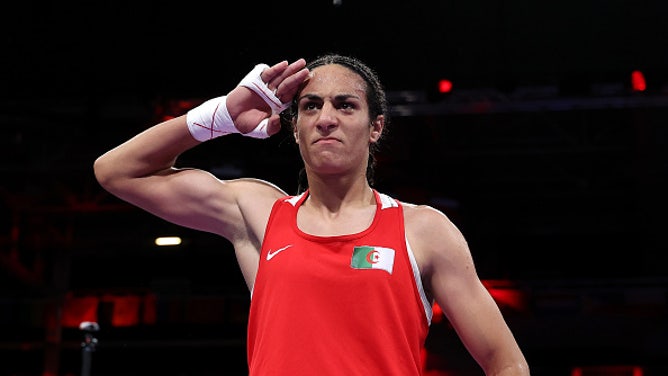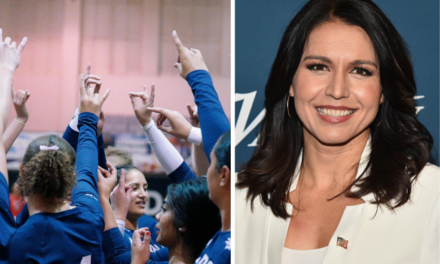We support our Publishers and Content Creators. You can view this story on their website by CLICKING HERE.
The Paris Summer Olympics were riddled with controversy after two athletes who previously failed gender tests won gold in women’s boxing. But former Olympic swimmer Sharron Davies said there’s a simple solution for the International Olympic Committee (IOC) to avoid this problem moving forward: mandatory sex screenings.
“I was sex screened in 1976 as a 13-year-old when I went to my first Olympic Games,” Davies said. “It was a cotton swab to the inside of your cheek which took less than 10 seconds. It needs to be done once in your lifetime because human beings cannot change their biological sex.”
RELATED: United Nations Hosts Panel On Upholding Safety And Fairness In Women’s Sports
Davies served as a panelist during an event titled “Upholding Safety And Fairness In Women’s Sports” at the United Nations Headquarters on Wednesday. Panelists discussed the various hurdles faced by female athletes across the globe — focusing mainly on the topic of males competing in women’s sports.
Davies and the other advocates discussed multiple instances of trans-identifying males infringing on safety and fairness for female athletes. And Davies shared her personal experience of witnessing the two controversial boxers dominate in the Paris Olympics.
The boxers in question, Algeria’s Imane Khelif and Taiwan’s Lin Yu-ting, are not transgender. However, the International Boxing Association (IBA) previously banned both of them from competition after a gender test showed they had XY chromosomes, rather than the female XX.
“In boxing, it is a serious life-threatening, possibly life-ending event waiting to happen,” Davies said. “And in my opinion, it is criminal negligence to allow a male to be boxing a female. And that was the feeling around Paris. The feeling of the athletes, the coaches, the general public was that what we were seeing was not fair when a very simple sex screening could remove any form of ambiguity.”

Imane Khelif, who was previously banned by the IBA after failing a gender test, won a gold medal in women’s boxing at the Paris Olympics.
(Photo by Richard Pelham/Getty Images)
Sharron Davies Wants IOC To Bring Back Sex Screening
When Davies was competing, sex verification tests were commonplace in the Olympic Games. But the IOC board voted to discontinue the practice in 1999.
Riley Gaines Podcast: Biological Males Competing Against Women 10x As Bad As The East German Women Olympic Doping Scandals
According to a 2000 article in the journal Genetics in Medicine, the reasons cited were the high cost and complexity of the process, as well as making female athletes feel uncomfortable. However, the IOC’s own survey conducted during the Atlanta Olympics shows that this was untrue. A full 82 percent of female Olympians favored the continuation of sex testing, and 94 percent reported feeling no discomfort from the procedure.
But “the IOC disregarded that altogether,” Davis explained.
“If you want to be an athlete of any level whatsoever, you’re going to have to consent to, obviously, drug testing, and drug testing is far more intrusive,” Davis said. “So to use the word ‘intrusive’ against sex screening is a misnomer. It’s just not true.”

Former Olympic swimmer Sharron Davies wants the IOC to bring back mandatory sex screening for athletes.
(Getty Images)
Currently, it’s the IOC’s policy to defer to the international governing bodies of each individual sport in order to determine athlete eligibility. Several sports, like swimming and track and field, have banned all athletes who underwent male puberty from participating in the women’s division.
But as Reem Alsalem, the U.N.’s special rapporteur on violence against women and girls, explains, sex screening would eliminate any gray area and ensure fair competition for women across the board.
“Let’s say the boxers were not working against the inclusion guidelines, but it was unfair to the women because their needs as females were not explicitly recognized as grounds for non-discrimination,” Alsalem said during Wednesday’s panel. “So I am hoping to take this up with the IOC and encourage them, really, to amend that.
“I also support very much the call that has been made by most — by many, actually — female athletes that we should be able to go back to sex screening. We have the technology. It is simple, it is non-invasive, it is reliable, and it would result in avoiding all these issues and in re-establishing fairness.”

 Conservative
Conservative  Search
Search Trending
Trending Current News
Current News 





